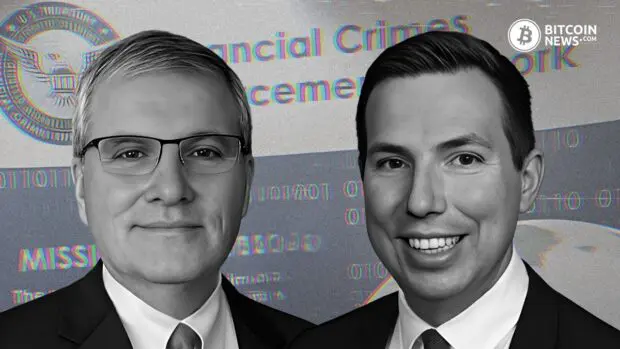The Financial Crimes Enforcement Network (FinCEN) has recently proposed a new plan that could significantly impact financial institutions and the broader digital asset industry.
FinCEN’s latest move aims to tighten the reins on digital asset mixers—services that obscure the source, destination, or amount of transactions. In an op-ed on Bloomberg Law, Steven Merriman and Jim Vivenzio of Perkins Coie highlight the potential disruptions posed by FinCEN’s expansive reporting proposal, stating:
“The amount of monitoring and reporting contemplated by FinCEN’s proposal could be disruptive.”
Definition of Mixing: A Broad Interpretation
The proposal broadens the definition of “mixing” and “mixers,” going beyond traditional mixing services like Tornado Cash. According to fintech compliance lawyers Merriman and Vivenzio, the scope now includes “innocuous blockchain transactions,” such as converting one form of digital asset to another. This expanded definition raises concerns about the impact on various digital-asset-related activities.
Steven Merriman and Jim Vivenzio added:
“For example, FinCEN calls out facilitating ‘exchanging between types of CVC or other digital assets’ as a form of mixing, which arguably covers any service that lets users exchange one form of CVC for another form of CVC or other digital assets, including centralized exchanges, decentralized exchanges, and non-fungible token marketplaces.”
Monitoring and Reporting Challenges
Merriman and Vivenzio argue that the level of monitoring and reporting suggested by FinCEN’s proposal could be disruptive. Financial institutions might find themselves navigating complex compliance measures, including reporting on transactions involving digital asset mixing features within or involving jurisdictions outside the U.S.
The proposal identifies a wide range of activities as potential targets for reporting. This includes pooling, algorithmic manipulation, splitting, using single-use wallets, exchanging between types of convertible virtual currency (CVC), and facilitating delays in transactions. Notably, the definition of mixing extends to services like exchanging between different types of CVC or other digital assets, covering centralized exchanges, decentralized exchanges, and Non-Fungible Token (NFT) marketplaces.
Concerns Beyond Illicit Finance
While FinCEN’s primary focus is on mitigating the risks associated with illicit finance related to digital asset mixers, Merriman and Vivenzio emphasize that the proposed reporting goes beyond these operations. The designation of a broad class of transactions as a “primary money laundering concern” could increase regulatory expectations for due diligence, leading to additional criteria for Suspicious Activity Reporting.
Potential Impact on the Digital Asset Market
The Treasury’s move to introduce a “secondary sanctions regime” further underscores its commitment to expanding regulatory power in the digital assets market. This regime aims to control companies or individuals within the U.S. financial system, preventing any firm from doing business with a sanctioned target. The implications are far-reaching, considering the dynamic and borderless nature of the market.
Related reading: “Bitcoin Is In Danger In U.S.” — Warns Hedge Fund Manager Paul Tudor
Analyzing FinCEN’s Grounds: Section 311 of the Patriot Act
FinCEN justifies its proposal using the “special measures” authority under Section 311 of the Patriot Act. This authority allows the Treasury to identify a foreign class of transaction as a “primary money laundering concern,” mandating domestic financial institutions to implement specific measures in response.
Challenges and Questions Raised by the Proposal
Merriman and Vivenzio point out several challenges and questions raised by the proposal. These include the application of criteria to situations where blockchain analytics don’t differentiate between wallets held by U.S. or non-U.S. exchanges, the need to report indirect exposure to CVC mixing, and concerns about data maintenance and access.
The legal experts anticipate that the proposed rule may force financial institutions to de-risk entire customer categories due to the broad monitoring and reporting obligations. Alternatively, institutions may engage in defensive filings, reporting on a wide range of transactions to comply with FinCEN’s definition of obfuscation.
Navigating a Shifting Regulatory Landscape
Public comments on FinCEN’s proposal are open until Jan. 22, 2024.
Analysts from TRM Labs, a blockchain forensic firm, predict that the U.S. Treasury Department will adopt a more aggressive stance towards sanctioning decentralized finance in 2024. Their focus is expected to be specifically on mixing protocols. This change in approach may establish a precedent for the entire digital asset industry.
As FinCEN’s proposal undergoes public scrutiny, the digital asset industry braces for potential disruptions. The broad scope of the reporting plan, coupled with the challenges it presents to financial institutions, underscores the need for a careful balance between regulatory oversight and fostering innovation in the realm of digital assets. The industry awaits the outcome of public comments and remains vigilant in adapting to the regulatory landscape that continues to shape its future.
Related reading:










